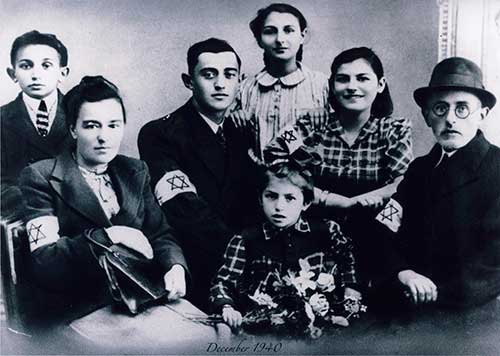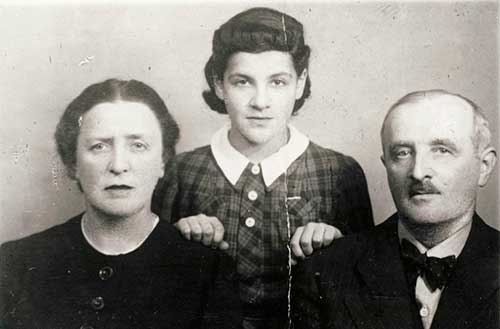From March of the Living ~ Our Stories
Nine Years Old – excerpt from Paula Lebovics’ story
 I was born Pesa Balter on September 25, 1933, in Ostrowiec Kielecki, Poland. My recollections of my family before and during the war years are seen through the eyes of a child.
I was born Pesa Balter on September 25, 1933, in Ostrowiec Kielecki, Poland. My recollections of my family before and during the war years are seen through the eyes of a child.
I lived with my parents, Israel and Perla Leah, and five siblings, Herschel, Jonathan, Chaya, Chana, and Josef. Our house was in a courtyard behind a large building owned by my grandfather Akiva Rosset. He was a well-to-do businessman in the liquor, forestry, and shoe and leather business. He built houses for all of his children within this courtyard. As a child, I was surrounded by family, other children, and lots of activity. Everyone in our family worked for my grandfather. My mother worked in the family shoe store housed in his building. The building still stands on Aleja 3 Maja in Ostrowiec today.
I was the baby of the family and about to celebrate my sixth birthday when the Germans took over our town. I was nine when they began rounding up the Jews. Those who were “chosen” during the first selection would be transported to Treblinka for immediate extermination, although we didn’t know that at the time. My uncle Natan Rosset and my eldest brother, Herschel, dug a hole under a shed where our family and extended family, about forty-four people altogether, hid underground. We only had enough food for one day, thinking that the selection process would last that long, but it went on for three or four days. Herschel told us he would let us know when it was safe to come out. From inside, I peered through the cracks to the roadway above, where the Germans were marching women and children for deportation to the town square. I saw women begging to be killed in place of their children, while soldiers ripped the children from their mothers’ arms and shot them and left them on the road.
After hiding for three days, Herschel told Chaya and Chana that they could come out because he thought their work papers would assure their safety. Their work papers did not save them. I was nine years old when Chaya and Chana were taken to Treblinka, where the Nazis would murder them. When my brother found out what had happened to my sisters, he lied to my mother to spare her grief. And though I was just nine, I knew what had happened to my sisters.
During the second selection, which took place in the winter, I was again put into hiding, this time with my mother and brother Josef. When it was over, we were brought back into the ghetto. I saw patches of pink snow on the ground and was keenly aware of what had caused the snow to turn pink.
A labor camp was built outside the ghetto, surrounded by ditches and enclosed with a barbed wire fence. The Germans wanted to empty the ghetto and reassign everyone to the labor camp as their slave laborers. My parents were taken to the labor camp, but I was too young to work, so I escaped with the help of Josef, who was only fourteen. The two of us went into hiding again, this time in a brick factory on a big compound just outside the ghetto. We would hide in one place during the day (sometimes with other children) and another place at night. Once we hid in a big iron vat until my feet began to swell. Another time we moved to a place overrun with rats. My brother left me there and decided to go out and find work in the labor camp. I remember deserting the rat-infested hiding place and walking out into broad daylight. I thought I too could find work.
But I was caught by a Ukrainian guard who grabbed me, tied my hands together, and walked me to the gate of the brick factory where an SS guard was in charge. A group of women were gathered near the gate waiting to go back to the labor camp. I saw my mother with them and tried to run to her. Although the women attempted to hide me, the SS guard pulled me out by the hand and threw me up against a wall. I must have passed out, because when I came to, everyone was gone except for the German SS guard. He was looking for other children who may have been hiding in the brick factory, and he wanted me to show him where they were. I told him I didn’t know where any children were hiding. I had the nerve to ask if he didn’t find other children would he please let me see my parents one last time. In my mind he agreed to this. After a futile search for children in the factory, he took me to the wall. But instead of letting me go, he pulled out his gun, held it to my head, and yelled for me to turn around. In a brave act of defiance I refused to turn around for him. I wanted him to keep his promise. At that very moment, he was distracted by laughter from a drunken comrade walking by. The soldier said to the SS guard (in German, though I understood because I spoke Yiddish), “Don’t waste a bullet on her. She’ll soon be dead anyway.” By some miracle the SS guard released me and I walked to the labor camp to become a worker.
Street Smarts and Common Sense – excerpt from Sidonia Lax’s story

It was the winter of 1943. December, in the town of Przemyśl, Poland, where I was born, was always gray and biting cold. We were planning an escape from the underground bunker we had been hiding in inside the ghetto. My mother had formed the plan. She had found us another hiding place outside the ghetto walls. She also knew a Polish policeman who guarded the ghetto gate, so she had paid him off and arranged for the time and place when we were to make our getaway. For his payment, he had promised to turn his back as we passed through the gates. On the appointed morning, my mother was the first to climb out of the bunker and approach the guard. Before my father and I climbed out we heard shots. Something had gone wrong. The regular policeman was not on duty and another, who was eager to arrest Jews, arrested my mother and took her to a jail housed in another Jewish camp within the city. With great fear and uncertainty my father and I returned to the underground bunker.
Before the war my parents owned a successful textile business and my mother, being the more business oriented, managed it with my father. I was born June 8, 1927, the only child of Cyla and Isaac Lewin. I was a spoiled rotten kid. Since my mother worked in our family business, I was left in the charge of my governess, who spent every waking hour with me. She took me to my many activities – dance lessons, ice-skating, and piano lessons. She even sat by when I played with my friends. At home we had three maids to help with the household chores. However, this didn’t keep me from learning how to properly keep house. My mother was a taskmaster and on the maids’ day off she taught me all about the art of proper housekeeping. I learned by doing to wash the floors, do the ironing, make the fire for the stove, sew and darn, and even mend damask tablecloths!
Our town of Przemyśl is located in the southeast corner of Poland. When the Germans invaded Poland from the west on September 1, 1939, our town came under German control for a brief time. Not too long after that the Russians invaded Poland from the east and our town was divided between the Germans and the Russians. We lived on the Russian side and for the two years of Russian occupation, I went to a Russian school. All my classes were conducted in Russian and I quickly learned to read, write, and speak the language fluently. In 1941 the Germans invaded again as they began their march toward Moscow, and as Jews, we were forced to move into a ghetto.
How did we survive in the ghetto? Amazingly enough we survived with the help of young children and funerals. Young children played a critical part in feeding the ghetto community. They were small enough to dig holes under the barbed wire fences and crawl out of our ghetto prison. Once in the city, they traded all sorts of things for extra food and then crawled back under the fence to deliver the much-needed food supplies. Coffins became a useful way to smuggle in extra food, too. People died in the ghetto every day, and the coffins that were used to bury them were constructed with false bottoms so that more food and supplies could be smuggled from the city back into the ghetto.
During the time that I was living in the ghetto, I was ordered to do manual labor. My job was to hammer large boulders into smaller pieces of rock. I suppose this may have been for the building of roads. I don’t really know. I just did as I was told by the Kapos (internal Jewish police force), who answered to the Nazis. It was strenuous work particularly for a slight girl of fourteen or fifteen. But it kept me alive. Later in the war, because the ghetto work had kept me healthy and strong, each time I was sent through a selection in a concentration camp, I was directed to the work detail instead of the gas chambers.
After living within the ghetto confines for about a year and a half, our situation had really deteriorated. My parents and some neighbors living in our apartment building decided to carve out a bunker under the building so we could hide from the Nazis. Throughout the night, the men would dig underground, passing the wet dirt to the women who would spread it out across the floor inside until it dried. Then we would take the dry dirt outside and spread it around. Wet dirt suddenly appearing outside our building would have been an obvious tip off as to what was going on inside during the nights. This was how we built an underground bunker that ultimately held thirty-five people.
When it was complete, we all disappeared underground. We hid there in darkness for three months. We could stand or sit but there was no room to lie down. The toilet was a hole dug in the corner and used by all thirty-five of us. I learned to cope. I was now sixteen years old, and for those three months I never washed myself, brushed my teeth or hair, nor saw the light of day. Our food sources were always scarce. A few days after our attempted escape and my mother’s arrest, my father became concerned for my health. He had heard that he might find some apples for sale, but he would have to leave our hiding place to get them. His decision to leave was fateful. It was the last I saw of him. He went out in search of an apple and was arrested just like my mother had been. I was now entirely on my own.